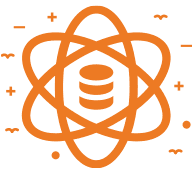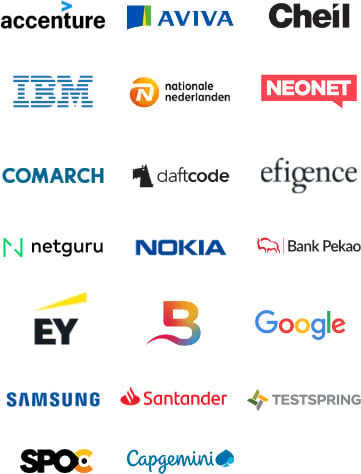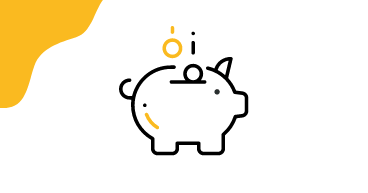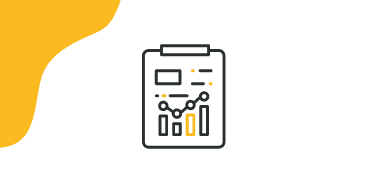
Why a Data Scientist course?
Data Science is a field of science and research which, thanks to the use of analytical, mathematical, statistical and programming knowledge, allows drawing conclusions from the collected data. Data Science, i.e. the ability to reason from data, can be used in almost any field to build, improve and optimize almost everything: business, products, processes.
By completing the Data Scientist course, you will learn to draw conclusions based on data and conduct in-depth data analysis using advanced machine learning tools and methods, e.g. predictive models.
Data Science specialists are constantly in demand on the labor market, and the fact that more and more companies and sectors are starting to work with Big Data strengthens data analytics as one of the main competences of the future.

Why is it worth it?
Data Scientist is the profession of the future. The demand for people with data science competencies is constantly growing, which is an opportunity for beginners who are looking for a well-paid job. Currently, to become a Data Scientist you do not need to have a PhD or Master's degree in mathematics. Companies do not set formal requirements regarding education, what matters is practical skills and projects in the portfolio.

Who is it for?
The Data Scientist course is for people interested in data analysis and advanced Data Science techniques such as machine learning and deep learning, which will enable even more advanced analyses.

What will you learn?
Define problems, collect data, clean and process it. Additionally, you will learn tools for data visualization and storytelling, data mining and defining new variables. At the same time, you will gain competences for in-depth data analysis - you will acquire skills in the field of machine learning.
Do you need more information?
Data Scientist course syllabus
INTRODUCTION TO DATA ANALYSIS
In a practical way and without prior preparation or experience, you will acquire the knowledge and skills necessary to take the first step towards the world of Data Science. You will learn the basics of statistics, use the Data Science chain and basic data analysis
PYTHON – DATA ANALYSIS
During this stage, you will learn how to automate the creation of reports using Python, obtain data from external websites and websites, and obtain data from database systems (ERP, accounting, etc.).
Forms of learning in Coders Lab
The course is conducted remotely on weekends. Thanks to this, you can easily combine learning with your daily duties.

Online Data Scientist course on weekends
In remote courses, you learn in a Virtual Classroom. This is online learning that combines live classes and self-study. All this on the proprietary Coders Lab platform. All you need is a computer and internet access. Find out more here.
-
- Classes are held on Saturdays and Sundays every two weeks at 9:00-17:00,
- 60% are live classes with a lecturer and a group in the Virtual Classroom,
- 40% is self-study at any time
- we record classes for you..
Upcoming dates
See where our graduates work
After completing the course at Coders Lab, you can seek employment in various fields. More and more companies will need data analysts to manage their businesses successfully. Our graduates work in the best IT companies in the country and abroad.


How to finance an IT course?
We know that a course is a big expense. That's why you can pay for it in two different ways.

From your own funds
You can pay for the course by traditional bank transfer. This is the fastest form of payment, without unnecessary formalities

Instalment payment
You can split the payment into instalments. The amount and number of instalments depend on the course and payment plan you choose.

Money-back guarantee
If, for any reason, you can't finish the bootcamp you have enrolled on, you will get a refund for the part of the course that you haven't completed.
Reserve your place for the next edition of the Data Scientist course!
Consult our Career Advisor and take part in a comprehensive course developing data science competencies.
During your conversation with your advisor, you will learn:
- what does the Data Scientist course look like in practice,
- what you need to take part in our course,
- what opportunities does the Data Scientist course give you.
Frequently Asked Questions
Are there any requirements to start the Data Scientist course?
To enroll in the Data Scientist course, you must have:
- basic knowledge of Excel (creating documents, basic editing and data entry),
- basic ability to read charts and the data they contain,
- willingness to deepen mathematical skills, logical thinking and drawing conclusions based on data,
- willingness to develop towards Data Science.
Will I receive confirmation of completion of the Data Scientist course?
Yes, after completing all modules, passing the exam or defending the final project, each Coders Lab student receives a diploma of completion of the IT course. Also, after successfully completing the Data Scientist course, you will receive a Certificate. All you need to do is pass the final exam after the entire course. For your future employer, it will be a clear confirmation of your skills!
What is the difference between the profession of a data analyst and a data scientist?
Data analyst - a profession that will be within your reach after completing the Data Analyst course - in short, organizes, cleans and analyzes data to find relationships between them and draw conclusions.
A data analyst in a company can deal with many things, but they all have one goal. They are intended to help you make accurate and well-thought-out decisions based on data. Therefore, a data analyst in a company can, for example:
- analyze customer behavior (including in an online store),
- analysis and understanding of trends to be able to prepare more effective sales strategies,
- track the results of business decisions made, analyze them and draw conclusions for the future,
- diagnose opportunities and threats for specific actions.
A data scientist can do exactly what a data analyst does, but he or she is more concerned with looking into the future. As a Data Scientist, he uses knowledge in the field of Machine Learning, thanks to which he can implement more advanced projects. You can acquire this knowledge by choosing the Data Scientist course (Premium Package of the Data Analyst course).
What is machine learning?
Machine learning has enormous potential that has taken over the world of technology, innovation and business. The goal of machine learning is to create algorithms that will teach machines to behave in a way that is as close as possible to the specificity of human thinking.
More and more companies are investing in the development of ML-based solutions, building demand for qualified employees who can use machine learning to solve business problems.
Knowledge of the basics of Machine Learning and the willingness to develop in this direction will be a big advantage during the recruitment processes for the position of Data Analyst. In turn, advanced knowledge of machine learning models opens the door to development as a Data Scientist.
What will I learn in the individual courses included in the Data Scientist course?
The Coders Lab Education Department has developed a comprehensive path for developing Data Scientist competencies.
For you, this means, above all, a well-thought-out course program that will help you step by step to become a junior data scientist. The whole thing is based on the most important points of the data analysis process, i.e. defining the problem, collecting data, cleaning and processing data, data exploration and defining new variables, in-depth data analysis, presentation of analysis results and making business decisions based on data.
During the classes, you will gain knowledge and skills related to, among others: With:
- basics of statistics,
- basics of analysis,
- programming,
- data visualization and storytelling,
- machine learning.
During the course, you work on the most important libraries, tools and programs necessary in data analysis. Their knowledge is required in the vast majority of job advertisements for data analysts and data scientists.
The Data Scientist course teaches:
- use the data analysis chain in practice,
- data analysis by working with extensive databases in Excel,
- automate report creation using Python,
- obtain data from internal and external websites or websites,
- obtain data from database systems (ERP, accounting, etc.),
- create effective and extensive queries in SQL,
- additional methods of formatting the output data set,
- principles of operation with relational databases,
- data storytelling and creating data-based stories,
- support libraries and data visualization tools,
- develop complete dashboards for analysis,
- use machine learning to make business decisions.
If you want to know more about this, check out the detailed Data Scientist course program.
How does Python help with data analysis?
The Python programming language has a simple syntax. It has also been developing rapidly for years, which is why it is very popular among both programmers and data analysis workers. However, the most important feature is its versatility, thanks to which you can automate your daily work.
This is particularly important when working with data, because it simplifies work on them and speeds up the creation of analyzes and reports. Thanks to knowledge of Python, the student is able to:
- automate the creation of reports,
- obtain data from external websites and websites,
- obtain data from database systems,
- automate data analysis activities.
How can I search for information in large data sets using SQL?
SQL is the third module of the Data Analyst and Data Scientist course. Thanks to the knowledge of this query language, you can build appropriate queries and find information in various databases. This way you ensure the credibility and completeness of your analyses.
You can use the SQL query language in virtually every relational database. In their daily work:
- you will start using transactions to safely handle data in the database,
- you will optimize the speed of database operation thanks to the use of indexes,
- you will expand and consolidate your knowledge about database modeling.
Using SQL is also a way to easily create aggregates for many sets and extract the necessary elements from them.
What does working as a Data Scientist involve?
A Data Scientist works according to the Data Science process, all in order to draw accurate conclusions and make the right decisions in his area of activity. Data Scientist, unlike Data Analyst, uses a number of even more advanced tools and methods, e.g. predictive models that allow to predict the future. During the Data Scientist course, you will learn to anticipate problems and set new business questions, design algorithms and models that automate data or Big Data analysis using the most modern methods.
How will the Data Scientist course prepare me to enter the world of Big Data and Data Science?
During the Data Scientist course, you will learn the basics of statistics, data analysis, programming, data visualization and machine learning. All modules successively expand your knowledge and skills. Importantly, you learn it under the supervision of practitioners and specialists who work with large data sets on a daily basis, and the world of Big Data holds no secrets from them.
According to the Data Scientist course program, you will learn to go through the entire Data Science analysis process. It consists of the following stages:
- defining problems,
- collecting data,
- data cleaning and processing,
- data mining and defining new variables,
- presentations of analysis results,
- application of machine learning models.

 We record classes for you
We record classes for you